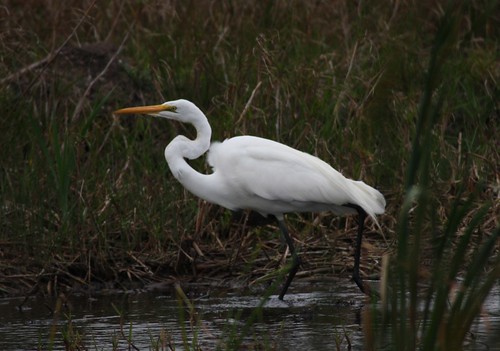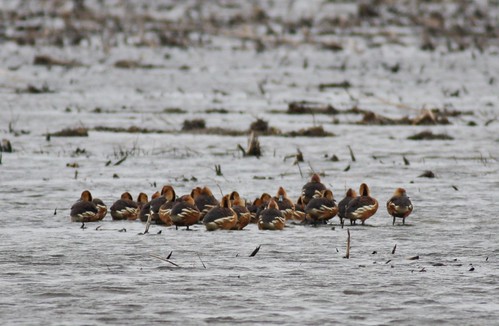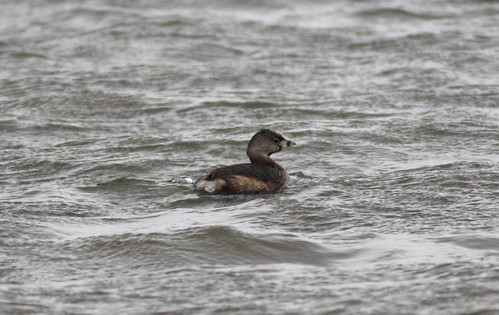
Photo courtesy of Bill Saulmon
The day started out on an auspicious note, with two Sandhill Cranes (the first of several lifers of the day for me) and a small flock of White-fronted Geese standing in a field nearby, and a White-tailed Kite hunting overhead. Unfortunately, a cold front had moved through the night before, leaving heavily overcast skies and buffeting winds that blasted us throughout the morning. I'll blame the poor light and blustery weather for the uninspiring quality of my photos from the trip — that's my story and I'm sticking to it!
When all had arrived, we headed to Bobcat Woods to start our adventure. The walk through the trees shielded us from the wind, but it also kept all but a handful of cardinals, kinglets and warblers under cover.
Moving out of the forested area, we were assaulted full-force by the cold winds as we stopped at the Wolfweed Reservoir. The few scopes that were brought out were shaking so hard that they were only minimally effective, but we did manage to spot a few ducks, cormorants and dowitchers.
Oh, and for the record, the title of the post does not refer to the wonderful group of birders that attended this trip. Rather, it's a tip of the hat to these hardy fellows who alone did not seem to mind the wind and weather one bit:

American Coot (Fulica americana)
There were literally hundreds of American Coots dotting the wetland areas we visited, easily outnumbering any other species we saw.
There were a few interesting sights to be seen at Wolfweed. A lone juvenile Little Blue Heron made its slow way along the water's edge, off to one side of us. Everyone perked up at the sight of an immature Bald Eagle in the distance; I believe the consensus of the group put him down as a third year bird. We also had near flyovers of several White Ibis, Turkey Vultures and a lone Crested Caracara.

White Ibis (Eudocimus albus)
Retreating to the refuge of our vehicles, we made our way to the drive around Moccasin Pond. This, finally, was where most of the birds had taken shelter, hunkered down among the reeds and small islands that littered the area. Here were more coots, candy-corn billed moorhens, Boat-tailed Grackles and Red-winged Blackbirds. Here, too, were spoonbills, ibises, night-herons and egrets.

Great Egret (Ardea alba)
There were also ducks aplenty, including Shovelers, Pintails, Gadwalls, and both Blue- and Green-winged Teal. One of the highlights (and another lifer for me) was a small group of twenty or so Fulvous Whistling-Ducks huddled together near a floating gator.

Fulvous Whistling-Ducks (Dendrocygna bicolor)
Another bit of excitement came when we spotted a Peregrine Falcon actively hunting, diving in an attempt to stir up the ducks on the surface of the lake. Not far away, one of several Northern Harriers that we saw throughout the morning was also hunting, and it almost seemed for a short time that the two were working together to herd the waterfowl between them.
We did see a few shorebirds, although not as many as we expected. There were a handful of Yellowlegs (both species) running across the mudflats, and a small flock of Black-necked Stilts.

Black-necked Stilts (Himantopus mexicanus)
We also found two more lifers for me, a pair of Grebes. There actually were quite a few Pied-billed Grebes swimming along, not far from the roadside bank of the pond.

Pied-billed Grebe (Podilymbus podiceps)
But the bird that many in the group were hoping to see was the Least Grebe that had been reported several times recently at the refuge. To everyone's delight, we finally found the grebe near the opposite end of the loop. Unfortunately, he was actively diving and moving quickly away from us, and between his constant motion and small size and the choppiness of the water, I was unable to get a decent picture of this tiny water bird. (See BirdingBev's recent post for a great capture of the Least Grebe from her visit to San Bernard NWR.)
Although I was very disappointed with the majority of the photos I came away with, I can't complain about any other aspect of this trip. The weather could have been a little more cooperative, but all in all it was an outstanding excursion. I came away with several new additions to my life list, and a total of somewhere around sixty species overall. You can bet that I will gladly go back to San Bernard NWR at the earliest opportunity.







6 comments:
Sounds like an awesome place to go birding!
Very neat outing and you did get some good shots there. I spotted a few black-necked stilts here in AZ awhile back and that was about the time I realized I was becoming a birder when I started saying "wonder what kind of bird that is?" http://tinyurl.com/8davrf
All of those pictures are lovely!
Good grief...that kind of birding should be illegal! A great day!
Fulvous Whistling Duck. You got the Fulvous Whistling Duck? I didn't see no stinking Fulvous Whistling Duck. Well, it's another reason to go back to Texas. Glad you got the Least Grebe. That is one cool bird. Super photos Kyle. I sounds like you had a nice trip even if the weather was not optimal.
Color me green with envy! I live down to the south of you, and I had heard Eagles were coming back!
Post a Comment